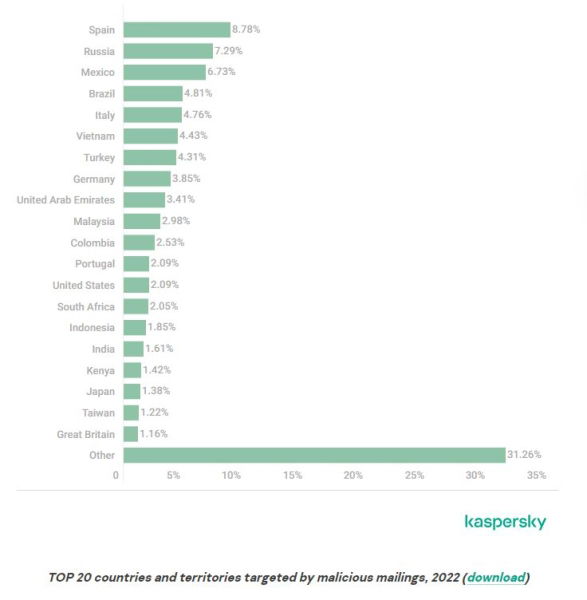
Study: Millions of Malaysians are still victims of malicious mailings
share on
Malaysia has been ranked 10th among 20 countries targeted by malicious mailings in 2022. In 2022 alone, cybersecurity company Kaspersky saw an increase of 18 million malicious email attachments compared to 2021. These emails were reportedly disguised as business correspondence, in an attempt to convince recipients to open the attachments. In most cases, the trojan virus is downloaded upon the malicious document being opened.
According to data gathered by Kaspersky, majority of phishing pages were hosted in the ‘.com’ domain zone, and generally associated with entertainment content, which it believes could have been what attracted victims to it. According to Chris Connell, managing director for Asia Pacific at Kaspersky, scams promising compensation and payouts from government agencies, large corporations, and banks are likely to remain popular among cybercriminals in 2023.
Connell went on to add that the web threats in Malaysia in the past five years have actually reduced. However, as technology advances, cybercriminals are becoming more creative in luring in victims which is why protection on devices is essential.

Don't miss: Malaysian communication and digital ministry to meet Telegram over rampant scam issue
Data collected from Kaspersky Secure Network (KSN) stated that the highest web threats in general were recorded in 2021 at 61.3 million, which reduced in 2022 at 37.1 million.
Malaysia's communications and digital ministry has been proactive in its attempts to protect Malaysians from the dangers of scams. An effort that Connell believes is necessary,
“It’s a good step towards a safer Malaysia. For our part, we have always been ready to collaborate and work on knowledge sharing with the public and private sectors in Malaysia to secure more Malaysians and the companies here,” he said.
Fahmi Fadzil, the head of the ministry, has been rather vocal about the ministry’s efforts against scammers, taking active steps towards ensuring the protection of Malaysians online. For instance, Telegram recently came under fire for the history of scams being that were making rounds over the past few months. Despite the rampant use of the app to share sensitive information, even by the National Security Council, Fahmi said that the government would not compromise the safety of the public.
In a townhall reported by Astro Awani, seen by A+M, Fahmi said that the issue is “not only about scammers, but also pornography and extremism which need to be checked urgently if they are spread through Telegram.”
Additionally, in December last year, the communications ministry took a stronger stance in looking into cyber security issues to protect the public’s personal data. "We must have an understanding that data is a national treasure. With data we can do various activities, we can make donations, help poor children, make sure that those who want to go to hospital get priority – everything revolves around data, safe data, then our future is safe," he said in Bicara Naratif programme produced by RTM News on 13 December 2022.
Related articles:
Kaspersky launches transparency centre in MY to build trust in cybersecurity
Cybersecurity firm Kaspersky denies reports on releasing Lion Group's data breach report
MY's new digital comms minister to meet social media firms on misinformation issue
share on
Free newsletter
Get the daily lowdown on Asia's top marketing stories.
We break down the big and messy topics of the day so you're updated on the most important developments in Asia's marketing development – for free.
subscribe now open in new window
